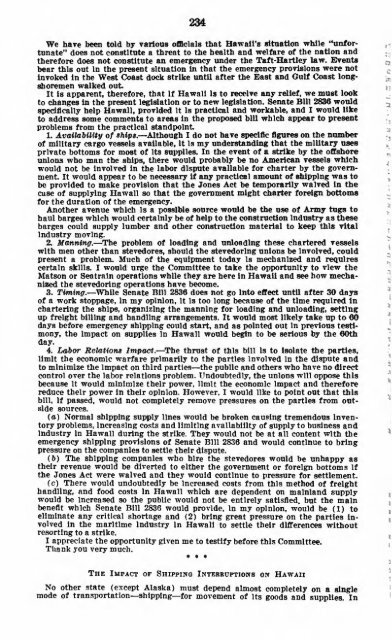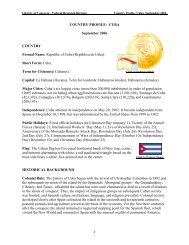1 - American Memory
1 - American Memory
1 - American Memory
Create successful ePaper yourself
Turn your PDF publications into a flip-book with our unique Google optimized e-Paper software.
234<br />
We have been told by various ofScials that Hawaii's sltnation while "unfor-<br />
tunate" does not constitute a threat to the health and welfare of the nation and<br />
therefore does not constitute an emergency under the Taft-Hartley law. Invents<br />
bear this out in the present situation in that the emergency provisions were not<br />
invoked in the West Coast dock strike until after the East and Gulf Coast long-<br />
shoremen walked out.<br />
It is apparent, therefore, that if Hawaii is to receive any relief, we must look<br />
to changes In the present legislation or to new legislation. Senate Bill 2836 would<br />
specifically help Hawaii, provided it is practical and workable, and I would like<br />
to address some comments to areas in the proposed bill which appear to present<br />
problems from the practical standpoint<br />
1. Availability of ships.—Although I do not have specific figures on the number<br />
of military cargo vessels available, it is my understanding that the military uses<br />
private bottoms for most of its supplies. In the event of a strike by the offshore<br />
unions who man the ships, there would probably be no <strong>American</strong> vessels which<br />
would not be Involved In the labor dispute available for charter by the govern-<br />
ment. It would appear to be necessary if any practical amount of shipping was to<br />
be provided to make provision that the Jones Act be temporarily waived in the<br />
case of supplying Hawaii so that the government might charter foreign bottoms<br />
for the duration of the emergency.<br />
Another avenue which is a possible source would be the use of Army tugs to<br />
haul barges which would certainly be of help to the construction industry as these<br />
barges could supply lumber and other construction material to keep this vital<br />
industry moving.<br />
2. Manninff.—The problem of loading and unloading these chartered vessels<br />
with men other than stevedores, should the stevedoring unions be Involved, could<br />
present a problem. Much of the equipment today is mechanized and requires<br />
certain skills. I would urge the Committee to take the opportunity to view the<br />
Matson or Seatraln operations while they are here in Hawaii and see how mecha-<br />
nlEed the stevedoring operations have become.<br />
3. Timing.—While Senate Bill 2836 does not go Into efTect until after 30 days<br />
of a work stoppage, in my opinion, it is too long because of the time required in<br />
chartering the ships, organizing the manning for loading and unloading, setting<br />
up freight billing and handling arrangements. It would most likely take up to 60<br />
days before emergency shipping could start, and as pointed out in previous testi-<br />
mony, the impact on supplies in Hawaii would begin to be serious by the 60th<br />
day.<br />
4. Labor Relatioru Impact.—The thrust of this bill is to isolate the parties,<br />
limit the economic warfare primarily to the parties involved In the dispute and<br />
to minimize the Impact on third parties—the public and others who have no direct<br />
control over the labor relations problem. Undoubtedly, the unions will oppose this<br />
because it would minimize their power, limit the economic impact and therefore<br />
reduce their power in their opinion. However, I would like to point out that this<br />
bill, if passed, would not completely remove pressures on the parties from out-<br />
side sources.<br />
(a) Normal shipping supply lines would be broken causing tremendous inven-<br />
tory problems. Increasing costs and limiting availability of supply to business and<br />
Industry In Hawaii during the strike. They would not be at all content with the<br />
emergency shipping provisions of Senate BUI 2836 and would continue to bring<br />
pressure on the companies to settle their dispute.<br />
(6) The shipping companies who hire the stevedores would be unhappy as<br />
their revenue would be diverted to either the government or foreign bottoms if<br />
the Jones Act were waived and they would continue to pressure for settlement.<br />
(c) There would undoubtedly be increased costs from this method of freight<br />
handling, and food costs in Hawaii which are dependent on mainland supply<br />
would be increased so the public would not be entirely satisfied, but the main<br />
benefit which Senate Bill 2836 would provide. In my opinion, would be (1) to<br />
eliminate any critical shortage and (2) bring great pressure on the parties in-<br />
volved In the maritime industry in Hawaii to settle their differences without<br />
resorting to a strike.<br />
I appreciate the opportunity given me to testify before this Committee.<br />
Tliank you very much.<br />
• • •<br />
THE IMPACT OF SHIPPIWO INTEERUPTIONS ON HAWAH<br />
No other state (except Alaska) must depend almost completely on a single<br />
mode of transportation—shipping—for movement of its goods and supplies. In



![Albert Einstein Papers [finding aid]. Library of Congress. [PDF ...](https://img.yumpu.com/21604228/1/190x245/albert-einstein-papers-finding-aid-library-of-congress-pdf-.jpg?quality=85)





![American Colony in Jerusalem Collection [finding aid]. Library of ...](https://img.yumpu.com/17941275/1/190x245/american-colony-in-jerusalem-collection-finding-aid-library-of-.jpg?quality=85)



![Piccard Family Papers [finding aid]. - American Memory - Library of ...](https://img.yumpu.com/17941234/1/190x245/piccard-family-papers-finding-aid-american-memory-library-of-.jpg?quality=85)


